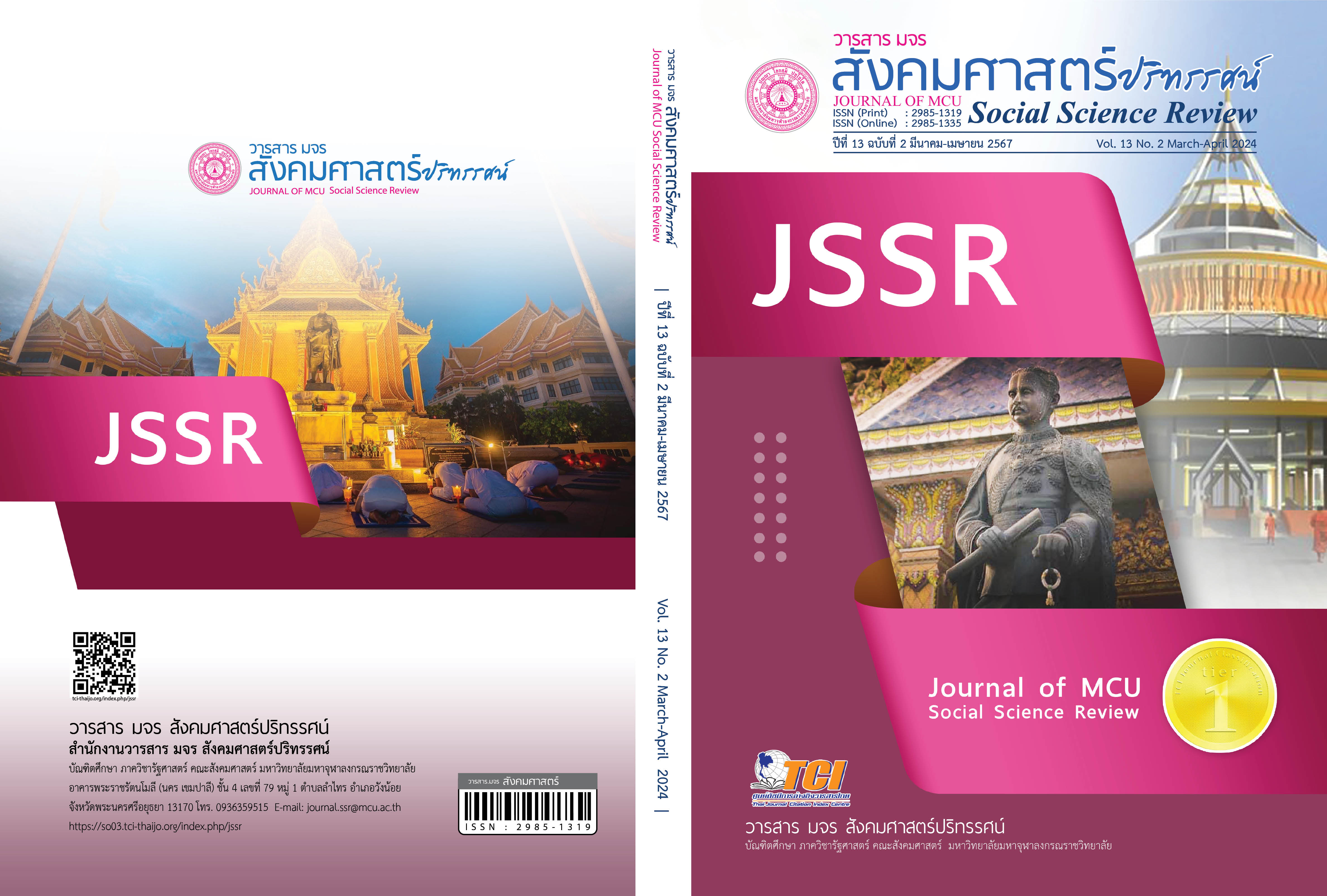อิทธิพลของความรับผิดชอบต่อสังคมขององค์กรที่มีต่อผลการดำเนินงานทางการเงินของบริษัทที่จดทะเบียนในตลาดหลักทรัพย์แห่งประเทศไทย
คำสำคัญ:
ความรับผิดชอบต่อสังคมขององค์กร, ผลการดำเนินงานทางการเงิน, หุ้น 100 อันดับแรกบทคัดย่อ
บทความวิจัยนี้มีวัตถุประสงค์ 1. ศึกษาอิทธิพลของความรับผิดชอบต่อสังคมขององค์กรที่มีต่อผลการดำเนินงานทางการเงินด้านอัตราผลตอบแทนต่อสินทรัพย์ 2. ศึกษาอิทธิพลของความรับผิดชอบต่อสังคมขององค์กรที่มีต่อผลการดำเนินงานทางการเงินด้านอัตราส่วนผลตอบแทนต่อส่วนของผู้ถือหุ้นของบริษัทที่จดทะเบียนในตลาดหลักทรัพย์แห่งประเทศไทย เป็นการวิจัยเชิงปริมาณที่เก็บข้อมูลจากบริษัทที่มีผลประกอบการอยู่ใน 100 อันดับแรก ระหว่างปี พ.ศ. 2562-2564 พบว่า มีบริษัทที่มีข้อมูลที่จำเป็นในการวิเคราะห์ที่มีความครบถ้วนสมบูรณ์จำนวน 79 บริษัท รวมทั้งสิ้น 237 ข้อมูล ความรับผิดชอบต่อสังคมขององค์กร (CSR) เป็นตัวแปรพยากรณ์ผลการดำเนินงานทางการเงินการวิจัยนี้กำหนดให้ตัวแปรควบคุม ได้แก่ ขนาดของกิจการ อัตราสินทรัพย์ที่มีตัวตนต่อสินทรัพย์รวม อัตราส่วนหนี้สินต่อสินทรัพย์รวม อัตราส่วนค่าเสื่อมราคาต่อสินทรัพย์รวม และเงินปันผลจ่าย วิเคราะห์ข้อมูลโดยใช้การถดถอยเชิงพหุ
ผลการวิจัยพบว่า ความรับผิดชอบต่อสังคมขององค์กรไม่มีอิทธิพลต่อผลการดำเนินงานทางการเงินทั้งด้านอัตราผลตอบแทนต่อสินทรัพย์ (ROA) และด้านอัตราส่วนผลตอบแทนต่อส่วนของผู้ถือหุ้น (ROE) การวิจัยนี้สามารถสร้างความรู้ใหม่ให้แก่หน่วยธุรกิจในการดำเนินนโยบายเพื่อกระตุ้นให้เกิดการรับรู้ถึงความรับผิดชอบต่อสังคมของภาคธุรกิจในประเทศไทยได้
เอกสารอ้างอิง
Ajina, A. S., et al. (2019). The importance of CSR initiatives in building customer support and loyalty: Evidence from Saudi Arabia. Asia Pacific Journal of Marketing and Logistics, 31(3), 691–713.
Ang, R., et al. (2022). The relationship between CSR and financial performance and the moderating effect of ownership structure: Evidence from Chinese heavily polluting listed enterprises. Sustainable Production and Consumption, 30, 117–129.
Ben Saad, S., & Belkacem, L. (2022). How does corporate social responsibility influence firm financial performance? Corporate Governance. The International Journal of Business in Society, 22(1), 1–22.
Bird, R. D. et al. (2007). What Corporate Social Responsibility Activities are Valued by the Market?. Journal of Business Ethics, 76(2), 189–206.
Bowen, H. R. (1953). Social Responsibility of the Businessman. Harper and Row.
Carlini, J., & Grace, D. (2021). The corporate social responsibility (CSR) internal branding model: Aligning employees’ CSR awareness, knowledge, and experience to deliver positive employee performance outcomes. Journal of Marketing Management, 37(7–8), 732–760.
Cho, S., et al. (2019). Study on the Relationship between CSR and Financial Performance. Sustainability, 11(2), 343.
Hahn, R. (2013). ISO 26000 and the Standardization of Strategic Management Processes for Sustainability and Corporate Social Responsibility: ISO 26000 and Strategic Management Processes. Business Strategy and the Environment, 22(7), 442–455.
Hillman, A. J., & Keim, G. D. (2001). Shareholder Value, Stakeholder Management, and Social Issues: What’s the Bottom Line?. Strategic Management Journal, 22(2), 125–139.
Koojaroenprasit, S., & Pumpinyo, S. (2019). Behavior of Adoption of a Low Carbon Society: A Case Study of Bangkok, Thailand. Retrieved March 20, 2022, from https://shorturl.asia/aGnQC
Lima, C. V., et al. (2011). Corporate social responsibility, firm value and financial performance in Brazil. Social Responsibility Journal, 7(2), 295–309.
Lu, W., et al. (2018). The paradoxical nexus between corporate social responsibility and sustainable financial performance: Evidence from the international construction business. Corporate Social Responsibility and Environmental Management, 25(5), 844–852.
Martínez-Ferrero, J., & Frías-Aceituno, J. V. (2015). Relationship Between Sustainable Development and Financial Performance: International Empirical Research: Corporate Social Responsibility, Financial Performance. Business Strategy and the Environment, 24(1), 20–39.
Orlitzky, M., et al. (2003). Corporate Social and Financial Performance: A Meta-Analysis. Organization Studies, 24(3), 403–441.
Rhou, Y., et al. (2016). CSR and financial performance: The role of CSR awareness in the restaurant industry. International Journal of Hospitality Management, 57, 30–39.
Stuart, A. C., et al (2021). Corporate Social Responsibility Disclosures and Investor Judgments in Difficult Times: The Role of Ethical Culture and Assurance. Journal of Business Ethics, 171(3), 565–582.
Sustainable Business Development Institute. (2013). Social Responsibility for Corporate Sustainability. Bangkok: IDEOL Digital Print.
Suto, M., & Takehara, H. (2021). Impact of corporate social responsibility intensity on firm-specific risk and innovation: Evidence from Japan. Social Responsibility Journal, 18(3), 484-500.
Texas A&M International University, et al. (2012). Lateral Collinearity and Misleading Results in Variance-Based SEM: An Illustration and Recommendations. Journal of the Association for Information Systems, 13(7), 546–580.
Titko, J., et al. (2021). Differences in Attitude to Corporate Social Responsibility among Generations. Sustainability, 13(19), 1-12.
Úbeda-García, M., et al. (2021). Corporate social responsibility and firm performance in the hotel industry. The mediating role of green human resource management and environmental outcomes. Journal of Business Research, 123, 57–69.
ดาวน์โหลด
เผยแพร่แล้ว
รูปแบบการอ้างอิง
ฉบับ
ประเภทบทความ
สัญญาอนุญาต
ลิขสิทธิ์ (c) 2024 วารสาร มจร สังคมศาสตร์ปริทรรศน์

อนุญาตภายใต้เงื่อนไข Creative Commons Attribution-NonCommercial-NoDerivatives 4.0 International License.
เพื่อให้เป็นไปตามกฎหมายลิขสิทธิ์ ผู้นิพนธ์ทุกท่านต้องลงลายมือชื่อในแบบฟอร์มใบมอบลิขสิทธิ์บทความให้แก่วารสารฯ พร้อมกับบทความต้นฉบับที่ได้แก้ไขครั้งสุดท้าย นอกจากนี้ ผู้นิพนธ์ทุกท่านต้องยืนยันว่าบทความต้นฉบับที่ส่งมาตีพิมพ์นั้น ได้ส่งมาตีพิมพ์เฉพาะในวารสาร มจร สังคมศาสตร์ปริทรรศน์ เพียงแห่งเดียวเท่านั้น หากมีการใช้ภาพหรือตารางหรือเนื้อหาอื่นๆ ของผู้นิพนธ์อื่นที่ปรากฏในสิ่งตีพิมพ์อื่นมาแล้ว ผู้นิพนธ์ต้องขออนุญาตเจ้าของลิขสิทธิ์ก่อน พร้อมทั้งแสดงหนังสือที่ได้รับการยินยอมต่อบรรณาธิการ ก่อนที่บทความจะได้รับการตีพิมพ์ หากไม่เป็นไปตามข้อกำหนดเบื้องต้น ทางวารสารจะถอดบทความของท่านออกโดยไม่มีข้อยกเว้นใดๆ ทั้งสิ้น





